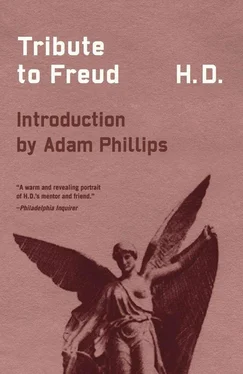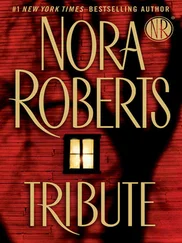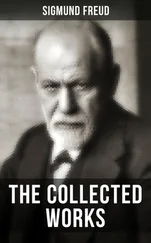The Professor said, there must be other “historical data” to do with my fear of being turned out. Yes, there were many actual associations. I remembered once, staying in Rome with my parents, running up to my room after a tired day’s excursion and finding the cupboard empty and nothing belonging to me on the dressing table. I had been moved downstairs to another bedroom. It was not the annoyance of not being consulted that so much concerned me as the shock of rushing upstairs and finding my clothes, shoes, and so on had disappeared mysteriously. I tell the Professor that when I go back to my room at the Regina, I seem to brace myself before unlocking the door, lest I find I have been moved out. I am reminded of the hotels we stayed in, in Florence, Rome, and Naples. I feel here that I am in an Italian or near-Italian city.
3:30 P.M.
Now having my early tea, I remember how the Professor asked me why I was so happy to have the hour 5 P.M. for my sessions. I told him how I had associated my happiest memories of early London with the inevitable four o’clock or five o’clock tea and that here I could dream over my note-book, preparing myself for the happiness of talking with him afterwards. He said again that he did not want me to prepare. I could not explain adequately that I did not. He does not, apparently, want me to take notes, but I must do that.
I remember how happy I was with the children across the street, playing at tea parties. We had our intermediate set of dishes for these occasions. My mother got me a set as I was so excited about the Williams’ “real tea set.” It was intermediate between the grown-ups and the dolls.
I think it was my seventh birthday that my mother got me this set. There was a gilt edge to the cups and saucers and the bread-and-butter-sized plates. There were knots of violets.
6:40 P.M.
The Professor found me reading in the waiting room. He said that I must borrow any books of his that I wanted. We talked again of Yofi. I asked of Yofi’s father. Yofi is to be a mother. He told me that Yofi’s first husband was a black chow and Yofi had one black baby, “as black as the devil.” It died when it was three-quarters of a year old. Now the new father is lion-gold and the Professor hopes that Yofi’s children will survive, this time. He said, if there are two puppies, the father’s people have one, but if only one, “it stays a Freud.”
The Professor asked me if I had noticed “trouble in walking.” I did not know what he meant. I said I was feeling well and enjoyed going about. But he said, “I mean, on the streets.” I did not even then quite realize what he meant; I said that I felt at home here and never frightened. I said, “The people in the shops are so courteous.” The Professor said, “Yes. . to a lady .”
The Professor asked me again of “historical associations” of moving or being moved. I told him of some of my findings.
I said that there were no doubt infantile associations about “leaving the room” or being sent out of the room because one had been naughty. He said, “Yes, the infantile memory or association is often unhappy.”
But leaving home was not always an unhappy matter. I was sent to stay with a young childless aunt at one time, and will never forget the giant rag doll, a treasure from her childhood that she gave me to play with. She it was who first gave me little gauze bags of assorted beads and helped me to string them. I had had a dream with Miss Chadwick that my uncle’s name was Vaneck; it was really Frederick.
I spoke again of our toy animals and he reminded me of my tiger fantasy. Wasn’t there a story, “the woman and the tiger,” he asked. I remembered “The Lady or the Tiger.”
Today, I entered my third week.
March 16, 7 P.M.
I saw a volume of Arthur Waley’s on the shelf, and asked the Professor if he knew him. He said no. I started to tell the Professor how I had met Waley in London in the very early days, at the British Museum where I was reading and how he asked me to tea in the Museum Tea Room. We discussed an umbrella I was carrying, en-tout-cas they had called it, at the shop, to my amusement. Later, during the war, I met Arthur Waley at Iseult Gonne’s flat in Chelsea. I said I thought Waley was a Jew, Freud said he thought so, but “he has tampered with his name.”
I went on to tell Freud why I had kept away from psychoanalysis in London, had read practically nothing until recent years, how Waley in our Buckingham Mansions, Kensington, flat, about 1920, had suggested that a friend of his might help Bryher, how Dr. Ellis discouraged it, but how finally Bryher went for a few sessions to_____.
(At this moment, writing on a marble-topped café table, a tiny bunch of violets is placed on my note-book. I want to cry. In my embarrassment, I only gave thirty groschen; but the beggar with the shoe-box seemed pleased and vanished. In the same way, violets were laid on the pages of a paperbound copy of Euripides’ Ion, open on the table of my Corfu Hotel Belle Venise bedroom. It seemed a “mystery” but Bryher must have left them.)
I went on to tell how I parted from Van Eck, in the drawing room of the Hotel Grand Bretagne in Athens. I said I was frozen.
Dr. Ellis, who was with us on the boat but in another hotel in Athens, went back to London after a few weeks. How cold it was — wind from Siberia — there was a stove in the corner of our elegant drawing room, everything was ormolu and gilded mirror frames — no sticks, no coal. Spanish influenza was raging there again.
Freud asked if Bryher had had it. Not dangerously, I explained. One of her father’s business associates there suggested that we leave Athens. We went up the Gulf of Corinth on the advice of this Mr. Crowe. In the night we stopped at Itea, below the landing or port for Delphi.
I tell the Professor how happy I was at Corfu — flowers, spring, orange trees, lead-pencil cypresses, Mouse Island or Böcklein’s Toteninsel. I told him of Bryher’s care of me, our walks and drives, and said the friendship seemed to have adjusted me to normal conditions of life. Freud qualified, “Not normal, so much as ideal.”
He wanted to know of the pictures, that I called Writing on the Wall, but the time was almost up so I simply stated that Van Eck all this time was in my mind. Bryher knew of this. The Professor said the problem was more subtle, more intricate than he had first imagined.
He said he did not wish me to prepare for my sessions with him. I said I did not. I spoke of my delight in the idea of resolving old problems.
When I told him of the Scilly Isles experience, the transcendental feeling of the two globes or the two transparent half-globes enclosing me, I said I supposed it was some form of prenatal fantasy. Freud said, “Yes, obviously; you have found the answer, good — good.”
March 17, 2:25 P.M.
Had strange dream of huge blackbirds. (Mr. Crowe of yesterday?) They peck or bite at my ankles with their great beaks. I am terrified. In some way, I am rescued by a youth or young man, and the polished black beaks of the birds turn to ebony anklets above my bare feet.
A friend of my school-days comes. She is looking for rooms. Rooms again. There is a confused sequence of a house or mansion with many rooms — my father’s house? I like Matilda and am glad to see her — but there is the old predicament! Will she interfere with my room or rooms? Is this a birth-anxiety? Bryher writes of joining me here later, with my daughter.
6:40 P.M.
The Professor asked me to interpret the dream of the blackbirds.
Freud said the man in the dream had given me womanhood, so he charmed the birds.
Читать дальше











